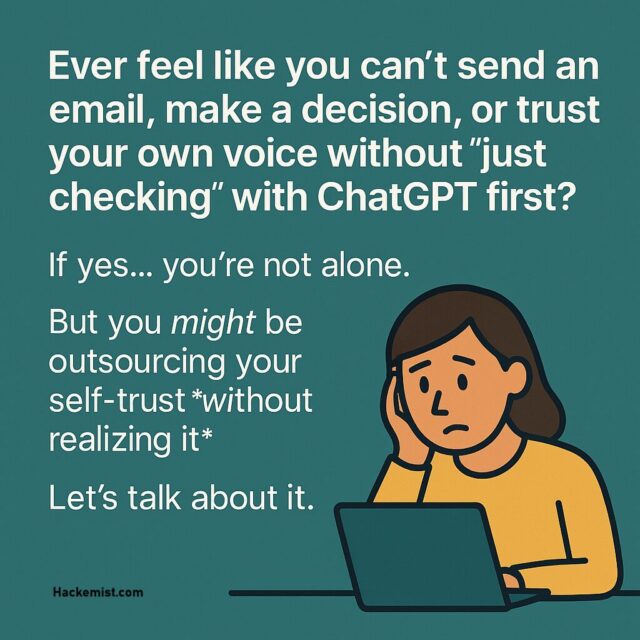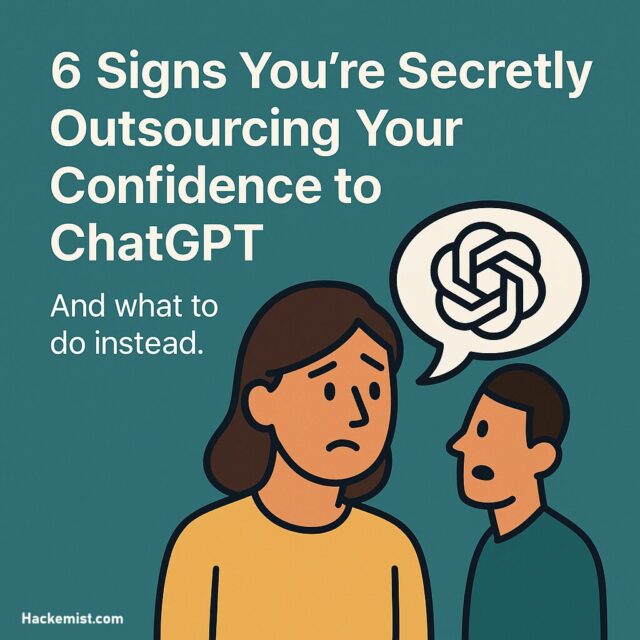Let’s be real. ChatGPT is impressive—scary impressive, sometimes. It can write your emails, explain quantum physics like you’re five, and even help you sort through your existential dread at 2 a.m. But here’s the thing: when a tool starts filling emotional or psychological gaps we’re not consciously aware of, it’s time to pause and take a closer look.
I say this not as a tech critic, but as someone who’s worked with people long enough to know that where we place our trust—especially in moments of self-doubt—matters. A lot.
So if you’ve caught yourself quietly relying on ChatGPT to feel more competent, more certain, or more “put together,” you’re not alone. But it might also mean you’re outsourcing your confidence without realizing it.
Here are six subtle but telling signs that your self-assurance might be running on AI autopilot.

1. You Can’t Hit “Send” Without Running It by ChatGPT First
Let’s start with one of the biggest giveaways.
You’ve written an email, a social media post, or a response to your boss—and before you hit send, you run it through ChatGPT to “just make sure it sounds good.”
Once in a while? Totally fine. But if this has become a reflex—if you feel low-key uneasy sending anything without getting a digital thumbs-up—there’s a good chance your confidence has started hitching a ride on AI.
Here’s the catch: ChatGPT isn’t a magic mirror. It doesn’t know your voice, your values, or your actual intentions unless you explicitly spell them out. So when you outsource too much to it, you risk sounding more polished than personal—and losing your own internal compass in the process.
There’s nothing wrong with asking for a second opinion. But when you can’t trust yourself to communicate without that reassurance, what you’re really saying is: “I don’t believe in my own voice until a bot approves it.”
2. You Avoid Making Decisions Until You’ve Asked ChatGPT
You’re standing in the kitchen, torn between two career paths or debating whether to break up with someone who’s kind but not quite right. What do you do? You ask ChatGPT.
Now, seeking clarity is one thing. But if you find yourself regularly outsourcing big (or even small) decisions to an AI, that’s worth examining.
What does it say about how much you trust your own judgment?
Often, it’s not really about getting “the answer.” It’s about avoiding the discomfort of not knowing, of being wrong, or of owning a hard choice. ChatGPT becomes a shield—a buffer against accountability.
But here’s the deal: real confidence isn’t about having all the answers. It’s about being willing to sit with uncertainty and move forward anyway. Sometimes it’s better to say, “I don’t know, but I’ll find out,” than to ask a machine that’s never lived your life for advice on how to live it.
3. You Let It Write Things You Could Say—But Don’t Feel Brave Enough To
There’s a subtle, slippery slope here.
You’ve got something important to express—an apology, a boundary, a compliment you’re afraid will land wrong. And instead of saying it yourself, you ask ChatGPT to “help you word it.”
At first, it feels helpful. Like having a thoughtful, articulate friend whispering just the right words. But over time, you might notice a growing distance between what you feel and what you say.
Because here’s what’s happening: the tool is replacing your raw, real voice with something more filtered, more neutral, more…safe. And that safety, while comforting, can come at the cost of authenticity.
Eventually, you might start to believe that your unedited voice isn’t enough. That your emotions need “translating.” That courage means saying things well—not just saying them honestly.
But confidence isn’t born from elegance. It’s built through vulnerability—through saying the hard things, imperfectly, in your own words.
4. You Use It to Validate Feelings You Don’t Trust in Yourself
This one’s more subtle, but just as revealing.
You feel anxious about a conversation, insecure after a meeting, or unsure about how someone treated you. So you ask ChatGPT: “Is it normal to feel this way?”
You’re looking for comfort, of course. But beneath that is a belief that your feelings aren’t valid until they’re confirmed by an external source.
And that’s the sneaky thing about confidence—it’s not just about what you do. It’s about how you relate to your own experience. When you regularly ask ChatGPT to double-check your emotional reactions, what you’re really outsourcing is your emotional authority.
I’ve been there. Doubting my instincts. Needing someone—or something—to say, “Yes, that makes sense.” But the truth is, your feelings don’t need permission to exist. They just need space to be felt, understood, and—sometimes—challenged on your terms.
5. You Depend on It for Creative Output You No Longer Believe You Can Produce Alone
Maybe you used to write poetry. Maybe you used to draft blog posts without flinching. Now, you need ChatGPT to kick things off—or worse, to “do it better.”
The danger here isn’t creativity becoming collaborative. It’s creativity becoming co-dependent.
When you start to believe your ideas aren’t good enough until ChatGPT shapes them, you’re handing over a key part of your self-trust: your creative confidence. And the more you do it, the more that belief calcifies.
Before long, you’re not just using AI to polish your work—you’re using it to access the parts of yourself you’re scared have gone quiet.
But they haven’t. They’re just waiting for you to stop deferring and start listening again. The blank page isn’t a test. It’s an invitation—to remember what you sound like when it’s just you and the words.
6. You Feel Lost When You Don’t Have Access to It
Ever been mid-thought, mid-decision, mid-email—only to realize ChatGPT is down, and suddenly you feel stranded?
That hollow moment? That’s what outsourcing confidence feels like when the power cuts out.
Confidence, real confidence, doesn’t depend on tools. It’s not about access. It’s about internal steadiness—a sense that you can figure things out even when your favorite support system isn’t available.
If ChatGPT going offline makes you feel more anxious than missing your therapist, that’s a sign you’ve developed an emotional reliance disguised as convenience.
It doesn’t mean you’re weak. It means you’re human. And like all of us, you crave clarity, competence, and connection. But those aren’t things you get from AI. They’re things you build—through practice, patience, and presence with yourself.
So, What Now?
Here’s what I’d suggest if any of these signs feel familiar:
- Pause before you prompt. Ask yourself: “Do I need help right now, or am I avoiding something uncomfortable?”
- Notice the patterns. When do you reach for ChatGPT? Is it during emotional overwhelm? When your inner critic is loud? Track the cues.
- Give your voice room to lead. Even if it’s messy. Even if it’s slow. Let it stumble without handing the mic over immediately.
- Use ChatGPT with confidence—not instead of it. Think of it as a tool that supports your growth, not a crutch that replaces your agency.
Because here’s the truth. You don’t need a perfect sentence or a polished answer to be worthy, competent, or enough.
You just need to remember that you were always allowed to trust yourself—even before the bots came along.
